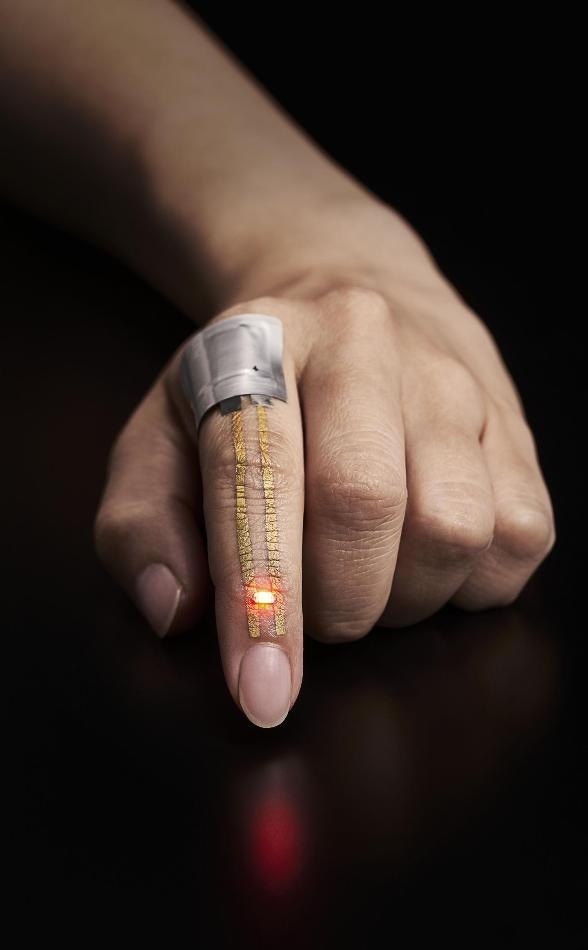Jul 18 2017
 The electric current from a flexible battery placed near the knuckle flows through the conductor and powers the LED just below the fingernail. CREDIT 2017 Someya Laboratory.
The electric current from a flexible battery placed near the knuckle flows through the conductor and powers the LED just below the fingernail. CREDIT 2017 Someya Laboratory.
It is now possible to wear a hypoallergenic electronic sensor on the skin continuously for a week without any discomfort. This sensor is extremely thin and light such that users tend to forget that they even have it on, explains a Japanese group of scientists.
The elastic electrode developed from breathable nanoscale meshes proves to be promising for the development of noninvasive e-skin devices capable of monitoring an individual’s health continuously over a prolonged time period.
Recent years have witnessed advancements in wearable electronics capable of monitoring heart rate and other significant health signals, with next-generation gadgets making use of highly elastic, lightweight materials fixed directly onto the skin for more precise, sensitive measurements. However, even though the ultrathin films and rubber sheets employed in these devices stick on and conform well to the skin, their lack of breathability is considered to be unsafe for prolonged usage: dermatological tests prove that the stretchable, fine materials prevent sweating and also block airflow surrounding the skin, leading to inflammation and irritation, which could eventually result in lasting psychological and physiological effects.
We learned that devices that can be worn for a week or longer for continuous monitoring were needed for practical use in medical and sports applications.
Professor Takao Someya, Graduate School of Engineering, University of Tokyo
In the present research, the group produced an electrode made from nanoscale meshes comprising of a water-soluble polymer, a gold layer, and polyvinyl alcohol (PVA)--materials that are considered to be biologically compatible with the body and also safe. It is possible to use this device by spraying a small amount of water, which dissolves the PVA nanofibers and then permits it to stick to the skin in an effortless manner. The device corresponded flawlessly to curvilinear surfaces of human skin, such as the ridges of an index finger's fingerprint pattern and sweat pores.
Next, the researchers performed a skin patch test on 20 subjects. These subjects were made to wear the device for a week and the researchers detected no inflammation on the participants' skin. The group also examined the permeability, with water vapor, of the nanomesh conductor — together with those of other substrates such as a thin rubber sheet and ultrathin plastic foil — and discovered that its porous mesh structure displayed greater gas permeability when compared to that of the other materials.
The scientists also proved the mechanical durability of the device via repeated bending and stretching, over and above 10,000 times, of a conductor fixed on the forefinger; they also proved its reliability as an electrode ideal for electromyogram recordings when its readings of the muscles’ electrical activity were comparable to those attained via standard gel electrodes.
"It will become possible to monitor patients' vital signs without causing any stress or discomfort," states Someya about the potential implications of the team's research. Besides medical and nursing care applications, the new device promises to enable precise, continuous monitoring of the bodily motion and physiological signals of an athlete without hindering their performance or training.